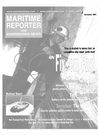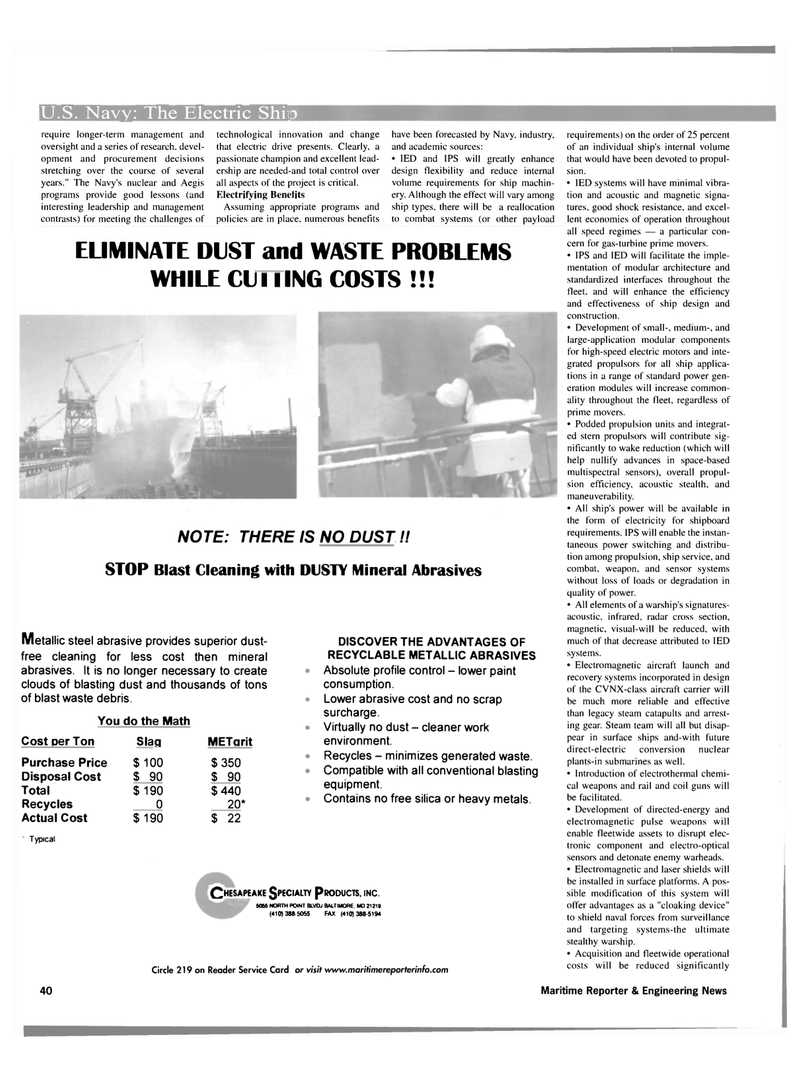
Page 40: of Maritime Reporter Magazine (November 2001)
Read this page in Pdf, Flash or Html5 edition of November 2001 Maritime Reporter Magazine
U.S. Navy: The Electric Shii require longer-term management and oversight and a series of research, devel- opment and procurement decisions stretching over the course of several years." The Navy's nuclear and Aegis programs provide good lessons (and interesting leadership and management contrasts) for meeting the challenges of technological innovation and change that electric drive presents. Clearly, a passionate champion and excellent lead- ership are needed-and total control over all aspects of the project is critical.
Electrifying Benefits
Assuming appropriate programs and policies are in place, numerous benefits have been forecasted by Navy, industry, and academic sources: • 1ED and IPS will greatly enhance design flexibility and reduce internal volume requirements for ship machin- ery. Although the effect will vary among ship types, there will be a reallocation to combat systems (or other payload
ELIMINATE DUST and WASTE PROBLEMS
WHILE CUTTING COSTS !!!
NOTE: THERE IS NO DUST 11
STOP Blast Cleaning with DUSTY Mineral Abrasives
Metallic steel abrasive provides superior dust- free cleaning for less cost then mineral abrasives. It is no longer necessary to create clouds of blasting dust and thousands of tons of blast waste debris.
You do the Math
Cost per Ton Slag
Purchase Price $100
Disposal Cost $ 90
Total $19
Recycles 0
Actual Cost $190
METqrit $350 $ 90 $440 20* $ 22
DISCOVER THE ADVANTAGES OF
RECYCLABLE METALLIC ABRASIVES
Absolute profile control - lower paint consumption.
Lower abrasive cost and no scrap surcharge.
Virtually no dust - cleaner work environment.
Recycles - minimizes generated waste.
Compatible with all conventional blasting equipment.
Contains no free silica or heavy metals.
Typical
CHESAPEAKE §PECIALTY PRODUCTS, INC. 5065 NORTH PCHNT BLVDJ BALTIMORE. MO 21219 (410) 388 50S5 FAX (410) 388 5194
Circle 219 on Reader Service Card or visit www.maritimereporterinfo.com requirements) on the order of 25 percent of an individual ship's internal volume that would have been devoted to propul- sion. • IED systems will have minimal vibra- tion and acoustic and magnetic signa- tures, good shock resistance, and excel- lent economies of operation throughout all speed regimes — a particular con- cern for gas-turbine prime movers. • IPS and IED will facilitate the imple- mentation of modular architecture and standardized interfaces throughout the fleet, and will enhance the efficiency and effectiveness of ship design and construction. • Development of small-, medium-, and large-application modular components for high-speed electric motors and inte- grated propulsors for all ship applica- tions in a range of standard power gen- eration modules will increase common- ality throughout the fleet, regardless of prime movers. • Podded propulsion units and integrat- ed stern propulsors will contribute sig- nificantly to wake reduction (which will help nullify advances in space-based multispectral sensors), overall propul- sion efficiency, acoustic stealth, and maneuverability. • All ship's power will be available in the form of electricity for shipboard requirements. IPS will enable the instan- taneous power switching and distribu- tion among propulsion, ship service, and combat, weapon, and sensor systems without loss of loads or degradation in quality of power. • All elements of a warship's signatures- acoustic, infrared, radar cross section, magnetic, visual-will be reduced, with much of that decrease attributed to IED systems. • Electromagnetic aircraft launch and recovery systems incorporated in design of the CVNX-class aircraft carrier will be much more reliable and effective than legacy steam catapults and arrest- ing gear. Steam team will all but disap- pear in surface ships and-with future direct-electric conversion nuclear plants-in submarines as well. • Introduction of electrothermal chemi- cal weapons and rail and coil guns will be facilitated. • Development of directed-energy and electromagnetic pulse weapons will enable fleetwide assets to disrupt elec- tronic component and electro-optical sensors and detonate enemy warheads. • Electromagnetic and laser shields will be installed in surface platforms. A pos- sible modification of this system will offer advantages as a "cloaking device" to shield naval forces from surveillance and targeting systems-the ultimate stealthy warship. • Acquisition and fleetwide operational costs will be reduced significantly 40 Maritime Reporter & Engineering News

 39
39

 41
41
